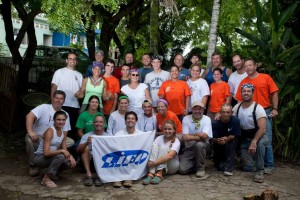 In the Dominican Republic, a little more than 37% of the population has access to clean drinking water. Several factors contribute to this lack of potable water: the degradation of river basins, population settlements alongside river banks, the lack of environmental sanitation and the disproportionate consumption of water by humans.
In the Dominican Republic, a little more than 37% of the population has access to clean drinking water. Several factors contribute to this lack of potable water: the degradation of river basins, population settlements alongside river banks, the lack of environmental sanitation and the disproportionate consumption of water by humans.
This situation becomes even more serious in rural communities, because many of them rely on rivers, streams and glens of meager volume for their water supply. The water from these sources is contaminated with debris, tree residues and animal waste from cattle that graze in the vicinity.
In order to reach their water supply, people have to travel up to 2 kilometers from their homes. This task is carried out on foot, on horseback, mules and/or on motorcycles and is usually done by women or children. They carry large containers (cans or gallons) on their head. In addition, rainwater collected from roofs is frequently used to satisfy the great demand for the precious liquid.
As a rule, rural housing does not include a safe and reliable water supply. In many instances, rural families lack water for cleaning their homes, washing clothes or personal hygiene. These deficiencies are reflected in the constant presence of gastrointestinal ailments, dermatitis, and gynecologic infections. In order to improve the living conditions of many rural families, ILAC Mission in collaboration with national and international volunteer groups has built important aqueducts, which have benefited the lives of thousands of families living in the countryside. These volunteer groups provide the funds and work with members of individual communities in the completion of the building project. From beginning to end, the community takes charge of the project. It creates a Water Committee, which is responsible for overseeing the proper functioning and maintenance of the aqueduct.
Rural aqueducts are built under the auspices of Grupo Life of Miami, Florida. Members of this group have been working in the Dominican Republic for over twenty years. They have carried out the wonderful task of bringing safe water to many needy and isolated communities in the D.R. Other volunteer groups, such as Miami’s Grupo Blue and Encuentro Dominicano (Creighton University’s Semester-long Study Abroad Program in the Dominican Republic) have collaborated in the construction of this important community project.